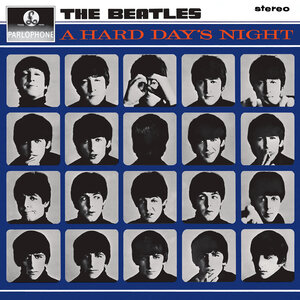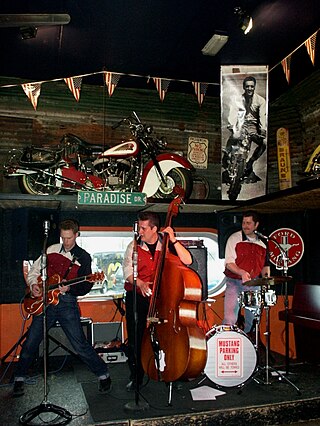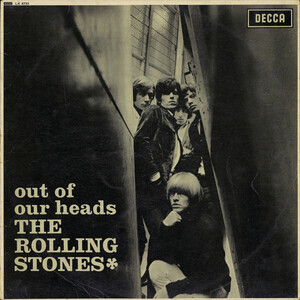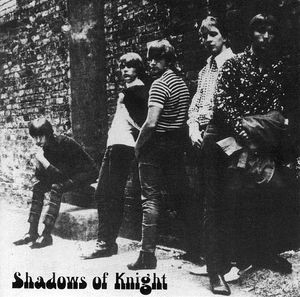
A Hard Day's Night is the third studio album by the English rock band the Beatles, released on 10 July 1964 by Parlophone, with side one containing songs from the soundtrack to their film of the same name. The American version of the album was released two weeks earlier, on 26 June 1964 by United Artists Records, with a different track listing including some from George Martin's film score. Unlike their first two albums, all 13 tracks on A Hard Day's Night were written by John Lennon and Paul McCartney.
Instrumental rock is rock music that emphasizes instrumental performance and features very little or no singing. Examples of instrumental music in rock can be found in practically every subgenre of the style. Instrumental rock was most popular from the mid-1950s to mid-1960s, with artists such as Bill Doggett Combo, The Fireballs, The Shadows, The Ventures, Johnny and the Hurricanes and The Spotnicks. Surf music had many instrumental songs. Many instrumental hits had roots from the R&B genre. The Allman Brothers Band feature several instrumentals. Jeff Beck also recorded two instrumental albums in the 1970s. Progressive rock and art rock performers of the late 1960s and early 1970s did many virtuosic instrumental performances.

Rockabilly is one of the earliest styles of rock and roll music. It dates back to the early 1950s in the United States, especially the South. As a genre, it blends the sound of Western musical styles such as country with that of rhythm and blues, leading to what is considered "classic" rock and roll. Some have also described it as a blend of bluegrass with rock and roll. The term "rockabilly" itself is a portmanteau of "rock" and "hillbilly", the latter a reference to the country music that contributed strongly to the style. Other important influences on rockabilly include western swing, boogie-woogie, jump blues, and electric blues.

Bow Wow Wow are an English new wave band, created by manager Malcolm McLaren in 1980. McLaren recruited members of Adam and the Ants to form the band with then 13-year-old Annabella Lwin on lead vocals. They released their debut EP Your Cassette Pet in 1980 and had their first UK top 10 hit with "Go Wild in the Country" in 1982. The band's music was characterized by a danceable new wave sound that drew on a Burundi beat provided by Dave Barbarossa on drums, as well as the subversive, suggestive, and sometimes exuberant lyrics sung and chanted by their teenage lead vocalist.

Out of Our Heads is the third studio album by the English rock band the Rolling Stones, released in two editions with different covers and track listings. In the US, London Records released it on 30 July 1965 as the band's fourth American album, while Decca Records released its UK edition on 24 September 1965 as the third British album.

The 5.6.7.8's are a Japanese rock band from Tokyo with a retro-inspired sound that draws heavily from the 1960s garage rock scene. They first started performing as a quartet in Tokyo, and recruited guest performers during their Australian tour. They became a trio in 1992, before touring Australia.
"When the Stars Go Blue" is a popular alternative country song composed and originally recorded by solo artist and former Whiskeytown band member Ryan Adams. It was first released on his album Gold on September 25, 2001, and has been described as the "most gorgeous ballad" on that album. "When the Stars Go Blue" has been covered by many artists, including Irish band the Corrs, country music singer Tim McGraw, and Norwegian artists Venke Knutson and Kurt Nilsen as a duo.

"Star Star" is a song recorded by the English rock band the Rolling Stones. It was written by Mick Jagger and Keith Richards. In a few select countries, the song was released as a single from the band's album Goats Head Soup (1973), with "Doo Doo Doo Doo Doo (Heartbreaker)" as its B-side. The song's title was changed to "Star Star" from "Starfucker" after Ahmet Ertegün of Atlantic Records insisted on the change.

"Good Rocking Tonight" is a jump blues song originally released in 1947 by its writer, Roy Brown and was covered by many recording artists. The song includes the memorable refrain, "Well I heard the news, there's good rocking tonight!" The song anticipated elements of rock and roll music.

"Call It Stormy Monday (But Tuesday Is Just as Bad)" (commonly referred to as "Stormy Monday") is a song written and recorded by American blues electric guitar pioneer T-Bone Walker. It is a slow twelve-bar blues performed in the West Coast blues-style that features Walker's smooth, plaintive vocal and distinctive guitar work. As well as becoming a record chart hit in 1948, it inspired B.B. King and others to take up the electric guitar. "Stormy Monday" became Walker's best-known and most-recorded song.
Woo Hoo, WooHoo, and spelling variants may refer to:

"Tobacco Road" is a blues song written and first recorded by John D. Loudermilk in December 1959 and released in 1960. This song became a hit for The Nashville Teens in 1964 and has since become a standard across several musical genres.
"Road Runner" is a 12-bar blues song performed by American rock and roll performer Bo Diddley, originally released as a single by Checker Records in January 1960, and later released on the LP record Bo Diddley in the Spotlight. The song reached #20 on Billboard magazine's Hot R&B Sides chart, and #75 on the Hot 100. The song has since been recorded by many artists.
The Rock-A-Teens were a short-lived United States rockabilly group from Richmond, Virginia, active in the late 1950s, led by Vic Mizelle.

"Rock On" is a song written by English singer David Essex. Recorded in 1973 and released as a single by Essex, it became an international hit. In 1989, American actor and singer Michael Damian recorded a cover version that went to number one on the Billboard Hot 100 chart. The song has been recorded many times, including a 2006 version by the English hard rock group Def Leppard.

Music for Cougars is Sugar Ray's sixth studio album, released in 2009. This was the last album to feature turntablist Craig "DJ Homicide" Bullock, bassist Murphy Karges and drummer Stan Frazier before their departures in August 2010 and early 2012, respectively.
"Peter Gunn" is the theme music composed by Henry Mancini for the television show of the same name. The song was the opening track on the original soundtrack album, The Music from Peter Gunn, released by RCA Victor in 1959. Mancini won an Emmy Award and two Grammys for Album of the Year and Best Arrangement. In 2005, the song was inducted into the Grammy Hall of Fame.

Daxton Paul James Monaghan is an Australian musician and songwriter based on the Central Coast, New South Wales. He released numerous albums and performed regularly along the east coast. Daxton's music was aired on national radio stations, and been used on television soundtracks. His style has varied over his career and is predominantly southern blues/rock.

"Wig-Wam Bam" is a song by British glam rock band The Sweet, written by songwriters Nicky Chinn and Mike Chapman, released as a single in September 1972. It was the first Sweet single on which the band members actually played their instruments, as previous singles featured producer Phil Wainman on drums, and session musicians John Roberts and Pip Williams on bass and guitars respectively.

Raw 'n' Alive at the Cellar, Chicago 1966! is a live album by the American garage rock band the Shadows of Knight, and was released on Sundazed Music in 1992. The album consists of recordings from the band's appearance at the Cellar in Arlington Heights, Illinois in December 1966. Although the tapes were never anticipated to be released publicly, Raw 'n' Alive at the Cellar is commended for its good sound quality, and represents one of the better live concert recordings to emerge from the garage rock era.














